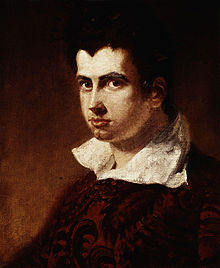
Elizabeth Barrett Browning was an English poet of the Victorian era, popular in Britain and the United States during her lifetime and frequently anthologised after her death. Her work received renewed attention following the feminist scholarship of the 1970s and 1980s, and greater recognition of women writers in English. Born in County Durham, the eldest of 12 children, Elizabeth Barrett wrote poetry from the age of eleven. Her mother's collection of her poems forms one of the largest extant collections of juvenilia by any English writer. At 15, she became ill, suffering intense head and spinal pain for the rest of her life. Later in life, she also developed lung problems, possibly tuberculosis. She took laudanum for the pain from an early age, which is likely to have contributed to her frail health.

An epigram is a brief, interesting, memorable, sometimes surprising or satirical statement. The word derives from the Greek ἐπίγραμμα. This literary device has been practiced for over two millennia.

"Jabberwocky" is a nonsense poem written by Lewis Carroll about the killing of a creature named "the Jabberwock". It was included in his 1871 novel Through the Looking-Glass, the sequel to Alice's Adventures in Wonderland (1865). The book tells of Alice's adventures within the back-to-front world of the Looking-Glass world.
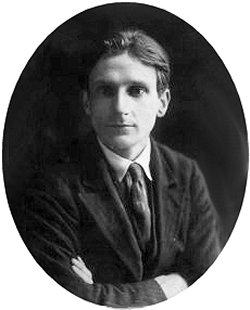
Edmund Charles Blunden was an English poet, author, and critic. Like his friend Siegfried Sassoon, he wrote of his experiences in World War I in both verse and prose. For most of his career, Blunden was also a reviewer for English publications and an academic in Tokyo and later Hong Kong. He ended his career as Professor of Poetry at the University of Oxford. He was nominated for the Nobel Prize in Literature six times.
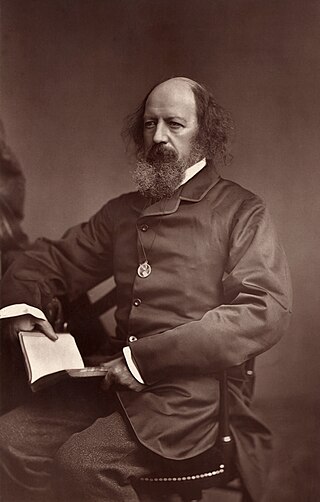
Alfred Tennyson, 1st Baron Tennyson,, was an English poet. He was the Poet Laureate during much of Queen Victoria's reign. In 1829, Tennyson was awarded the Chancellor's Gold Medal at Cambridge for one of his first pieces, "Timbuktu". He published his first solo collection of poems, Poems, Chiefly Lyrical, in 1830. "Claribel" and "Mariana", which remain some of Tennyson's most celebrated poems, were included in this volume. Although described by some critics as overly sentimental, his poems ultimately proved popular and brought Tennyson to the attention of well-known writers of the day, including Samuel Taylor Coleridge. Tennyson's early poetry, with its medievalism and powerful visual imagery, was a major influence on the Pre-Raphaelite Brotherhood.

James Henry Leigh Hunt, best known as Leigh Hunt, was an English critic, essayist and poet.

William Allingham was an Irish poet, diarist and editor. He wrote several volumes of lyric verse, and his poem "The Faeries" was much anthologised. But he is better known for his posthumously published Diary, in which he records his lively encounters with Tennyson, Carlyle and other writers and artists. His wife, Helen Allingham, was a well-known watercolourist and illustrator.

Jenny Joseph was an English poet, best known for the poem "Warning".
The spasmodic poets were a group of British poets of the Victorian era. The term was coined by William Edmonstoune Aytoun with some derogatory as well as humorous intention. The epithet itself is attributed, by Thomas Carlyle, to Lord Byron.
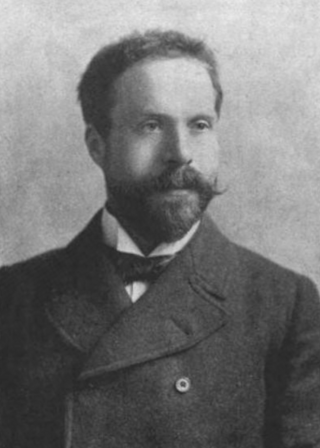
Ernest Percival Rhys was a Welsh-English writer, best known for his role as founding editor of the Everyman's Library series of affordable classics. He wrote essays, stories, poetry, novels and plays.
A rondeau is a form of medieval and Renaissance French poetry, as well as the corresponding musical chanson form. Together with the ballade and the virelai it was considered one of three formes fixes, and one of the verse forms in France most commonly set to music between the late 13th and the 15th centuries. It is structured around a fixed pattern of repetition of verse with a refrain. The rondeau is believed to have originated in dance songs involving singing of the refrain by a group alternating with the other lines by a soloist. The term "Rondeau" is used both in a wider sense, covering older styles of the form which are sometimes distinguished as the triolet and rondel, and in a narrower sense referring to a 15-line style which developed from these forms in the 15th and 16th centuries. The rondeau is unrelated to the much later instrumental dance form that shares the same name in French baroque music, which is more commonly called the rondo form in classical music.
Nationality words link to articles with information on the nation's poetry or literature.

Jane Baillie Carlyle was a Scottish writer and the wife of Thomas Carlyle.
"You Are Old, Father William" is a poem by Lewis Carroll that appears in his 1865 book Alice's Adventures in Wonderland. It is recited by Alice in Chapter 5, "Advice from a Caterpillar". Alice informs the Caterpillar that she has previously tried to repeat "How Doth the Little Busy Bee" and has had it all come wrong as "How Doth the Little Crocodile". The Caterpillar asks her to repeat "You Are Old, Father William", and she recites it.

"To Kosciusko" is the name shared by three sonnets written by Samuel Taylor Coleridge, Leigh Hunt, and John Keats. Coleridge's, the original, was written in December 1794 and published in the 16 December 1794 Morning Chronicle as the fifth of his Sonnets on Eminent Characters series. Hunt and Keats were inspired to follow his poem with their own versions in November 1815 and December 1816, respectively. The sonnets were dedicated to heroism of Tadeusz Kościuszko, leader of the 1794 Polish rebellion against Prussian and Russian control.
Bacchus and Ariadne is a poem by Leigh Hunt written and published in 1819. The result of three years of work, the poem tells the Greek myth of Hero and Leander, two lovers, and the story of their forlorn fate. Hunt began working on the poem during the summer of 1816, arousing the interest of the publisher John Taylor, and despite repeated delays to allow Hunt to deal with other commitments the poem was finished and published in a collection 1819. Hunt later claimed in a poem about Bacchus and Ariadne that he was seeking to humanise myths and make them more understandable to the common people. The collection was well received by contemporary critics and poets, including Thomas Carlyle, while more modern writers such as Edmund Blunden have criticised the flow of its narrative.
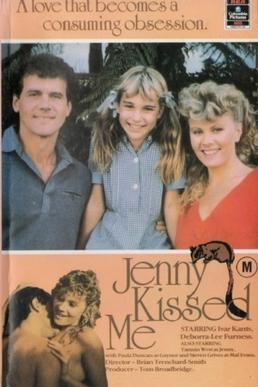
Jenny Kissed Me is a 1985 Australian drama film directed by Brian Trenchard-Smith. The director calls it a "tearjerker for men". It is inspired by Leigh Hunt's poem Jenny kiss'd Me, which appears in the opening credits.
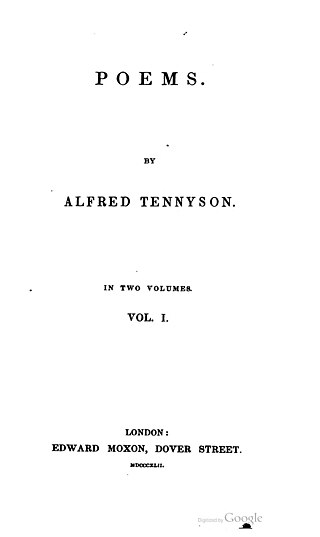
Poems, by Alfred Tennyson, was a two-volume 1842 collection in which new poems and reworked older ones were printed in separate volumes. It includes some of Tennyson's finest and best-loved poems, such as Mariana, The Lady of Shalott, The Palace of Art, The Lotos Eaters, Ulysses, Locksley Hall, The Two Voices, Sir Galahad, and Break, Break, Break. It helped to establish his reputation as one of the greatest poets of his time.
"Abou Ben Adhem" is a poem written in 1834 by the English critic, essayist and poet Leigh Hunt. It concerns a pious Middle Eastern sheikh who finds the 'love of God' to have blessed him. The poem has been praised for its non-stereotypical depiction of an Arab. Hunt claims through this poem that true worship manifests itself through the acts of love and service that one shows one's fellowmen and women. The character of Abou Ben Adhem is said to have been based on the ascetic Sufi mystic Ibrahim bin Adham. The poem, due to its Middle Eastern setting and spiritualistic undertones, can be considered an example of Romantic Orientalism. The first known appearance of this poem is in an album kept by the writer Anna Maria Hall, whose husband, Samuel Carter Hall published it in 1834, in his gift book The Amulet.
